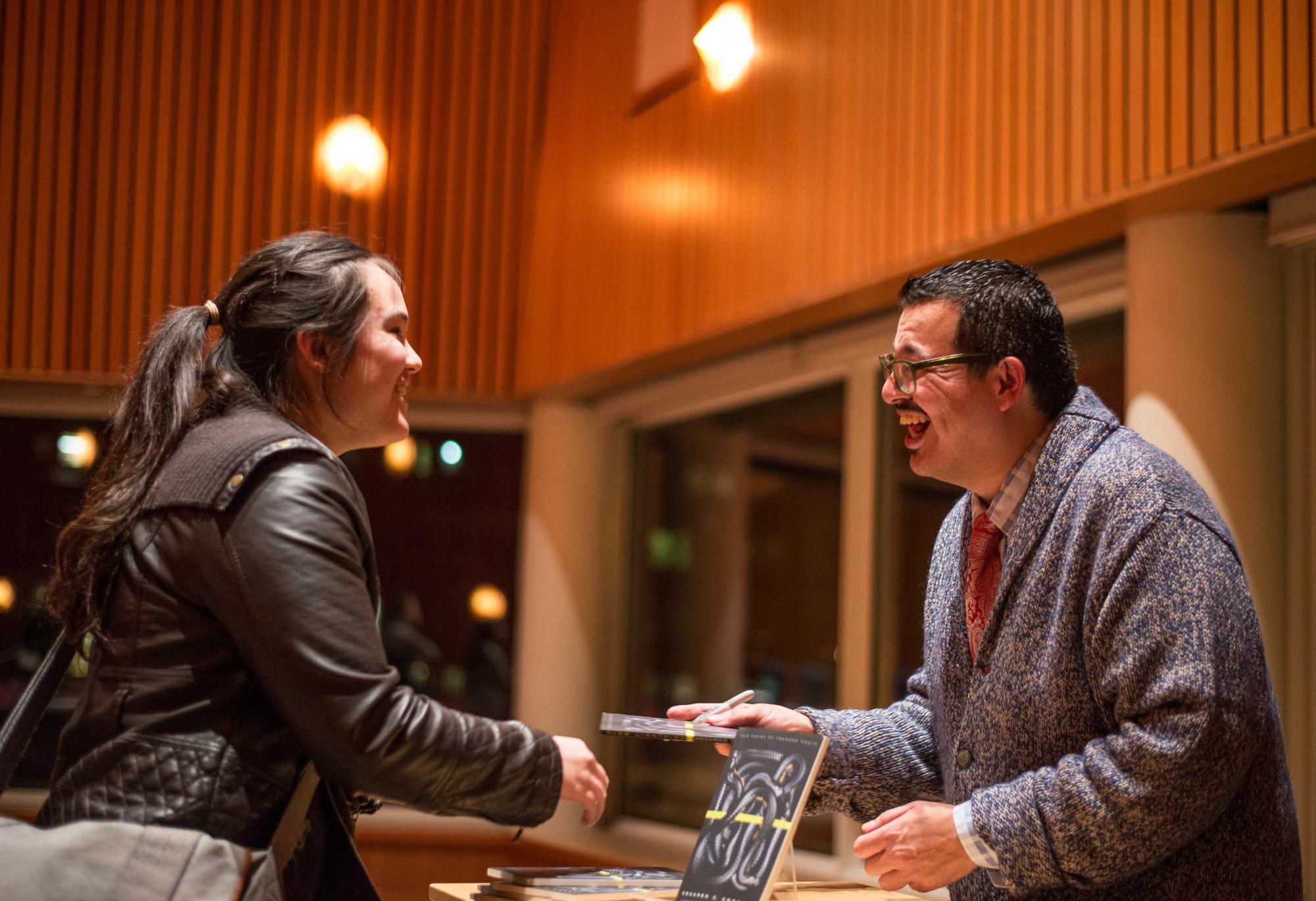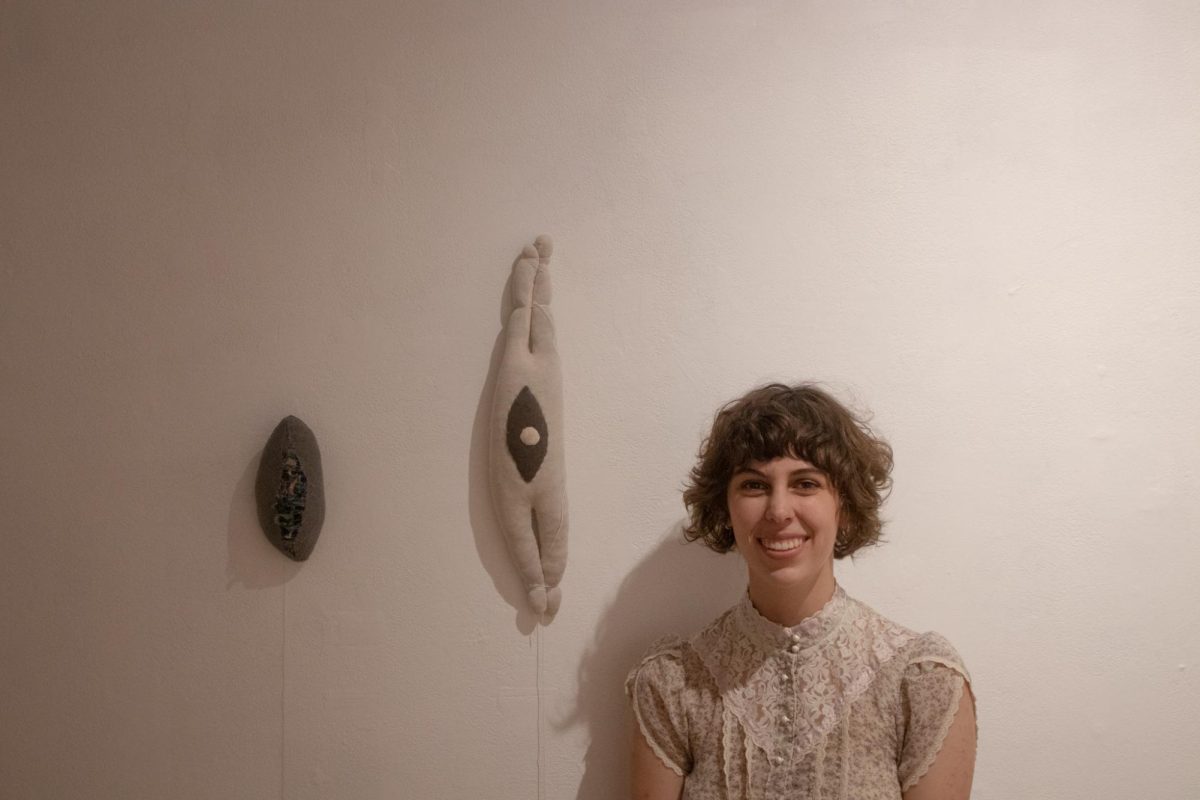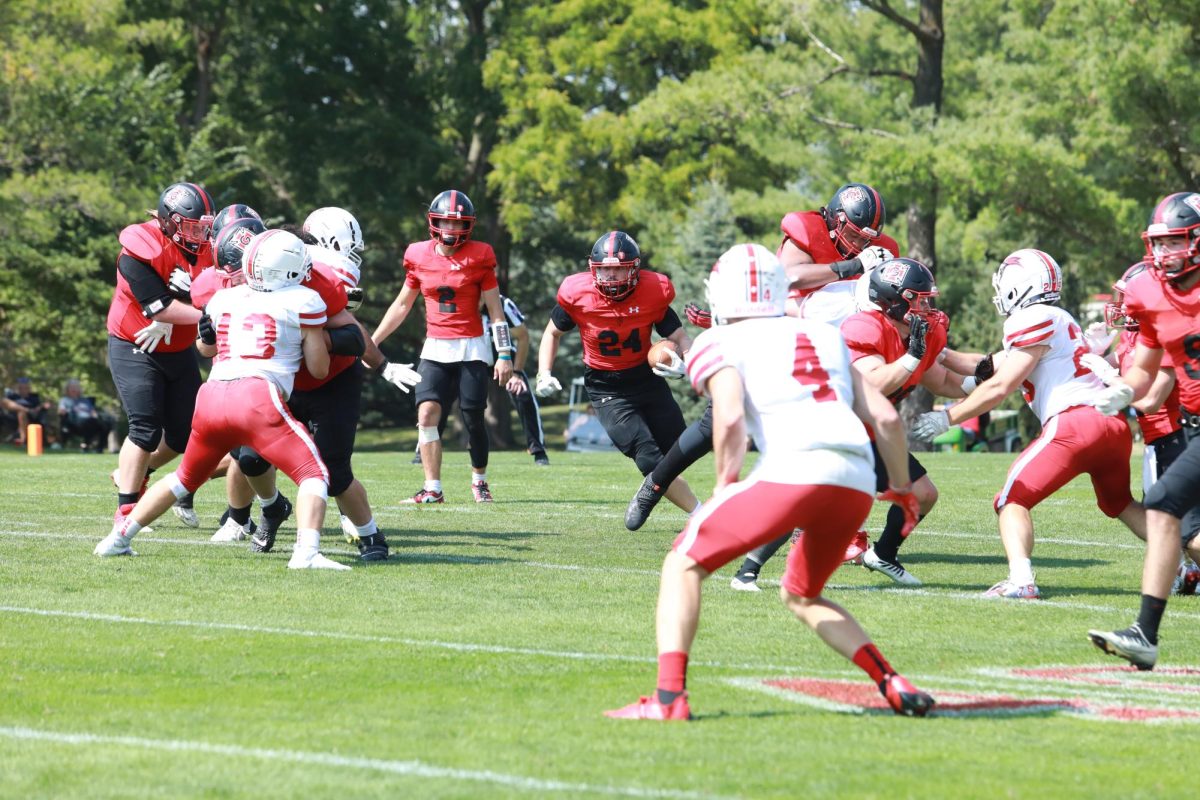In middle and high school, poet Eduardo C. Corral would cover lines in novels with a bookmark, taking the text in line-by-line, sentence-by-sentence. Words were difficult. The letter “o” seemed to go away. He harbored a fear of language. His strategy of isolating text would transform his fear of not-knowing into a fruitful site. Here, he developed an “infinite patience.”
Ten years ago, Corral visited the College in February 2014 for a Writers@Grinnell (W@G) event, where he read from his acclaimed first collection of poetry “Slow Lightning” (2012). So, perhaps in patience, he came back for another W@G on Nov. 14, 2024 with his second poetry collection “Guillotine” (2022). Corral had a roundtable discussion and generative poetry workshop at 4:15 p.m. at the Humanities and Social Sciences Center (HSSC) room S1325, followed by a reading in the Joe Rosenfield Center (JRC) room 101 at 8 p.m.
Corral was writing poetry before he was reading it. At Arizona State University, Corral was at the verge of dropping his Mexican-American literature class after discovering the class would become a poetry workshop mid-semester. Nevertheless, Corral remained in the class, and revisited his prior technique of isolating texts to aid in the creation of his own poetry, lingering word-by-word. To Corral, each word has its own “hyperlink.” Yet, each hyperlink contains a private association. “I say the word mother. I click on the word in my mind. I go somewhere,” he said at the roundtable. “You click on the word mother. In your mind, you go somewhere else.”
Corral dwells with the word. When Corral was living in Queens in the 2010s, his graduate school friends in the field of education helped him realize that he had been going undiagnosed for dyslexia.
After developing his unique poetic practice, Corral went on to attend the Iowa Writers’ Workshop in the early 2000s. This semester, he started teaching in the MFA creative writing program at Washington University in St. Louis.
At the poetry reading, Corral prefaced,“I don’t call them sonnets because I’m not delusional.” Then, he began reading two fourteen-line poems from his third collection.
He read “Lines Written During My Second Pandemic,” tying COVID-19 to the AIDS epidemic. The word “loneliness” appears in each line and re-configures the meaning. He followed with a rumination on a tree-like, immigrant cactus entitled “To a Blossoming Saguaro,” ending with “My mother is my favorite immigrant / After her? The sonnet.”
“Within these constrictions, these new spaces, the imagination and is allowed, is encouraged, to find ways to make it work,” said Corral. “The way many immigrants, when they first arrive, they find ways to make it work.”
In Corral’s poetic imagination of the border between the United States and Mexico, he adds queer voices to borderland literature canon.
Corral worked his way back to his first collection “Slow Lightning.” A “sexy” book cover, some audience members characterized, but Corral contended with “evocative.” After nine and a half years in the works, the book cover comes to readers with an overhead shot of snakes in a labyrinthine twist. The symbol of the eagle eating the snake centered on the Mexican flag is an ingrained icon for Corral, a son of Mexican immigrants. He doesn’t particularly like snakes, but snakes are surprisingly rich for poetic inspiration.
He heralded “Slow Lightning” with “Our Completion: On Oil on Wood: Tino Rodríguez: 1999.” This poem is also the first poem of his debut collection, weaving Mesoamerican gods and pop culture, queerness and desire, Spanish and English. “It was the first poem that felt all my selves,” he said. The poet went against this bilingualism in his poetry during his MFA, as he attempted to impress his anglophone audience. In his personal life, though, he would begin a sentence with English and end it with Spanish, or the inverse. There was a dissonance between his poetry and his personal expression born of a fear of displacing and alienating his monolingual audience.
Eventually, Corral decided to subsume the anxious, alienating feeling of displacement into aesthetic affect. “In Colorado My Father Scoured and Stacked Dishes” is the first poem he wrote that switched between Spanish and English. “I think of it as a site of wonder and discovery because I have to work my way back into the text,” he said.
For his second collection, Corral said that the voices in the desert at the border came to him again and again. This provoked a moment of crisis because he had been wary of making his second piece of work border-centric. However, his then-mentee-turned-dear-friend fellow poet Ocean Vuong reminded him to accept this impulse.
“We can spend our lives obsessing and writing about a few things,” said Corral. “I never exhaust them because that’s what writers do.”
With “Guillotine,” he approaches the border with a distanced, intense sense of unrequited love. The love an immigrant might feel for another country, for example.
Corral instinctively knew that the word “guillotine” would represent that burgeoning second book of poetry but was not exactly sure how — “a lovely word for a horrible instrument,” he said. In a cafe in Jackson Heights, Queens, not too far from the subway station, Corral sat down and wrote the word “guillotine” repeatedly, across the lines, down the page, until he reached the end of it. What arrived in his tangled cursive was the image of scorpions: “The scorpions always arrive / at dawn. Gently,” begins his titular poem.
In the persona of “Border Patrol Agent,” a forty-something Mexican-American border patrol agent, Corral came back to an image he conceptualized fifteen years ago in graduate school. The agent speaks about his father: “He often mistakes blue parakeets / perched / on the stove for gas flames.” He denies his darlings of death.
Corral currently stores his ideas on his marble, ancient even, iPhone 8+ and a baby blue Moleskin. For his third poetry book, he hopes it will be a “stranger” to his last two collections, which he views as “kin, holding hands.” But, still, he is dwelling in a space of not-knowing.
Corral said, “No surprise in the writer, no surprise in the reader.”
This is the last W@G event for the fall 2024 semester. For the spring 2025 semester, the current line-up includes poet Steven Duong ’19, essayist Emily Mester ’14, literary agent Clare Mao ’14, journalist Jessica Bruder and novelist Rachel Khong. Time and location will be added to the W@G website.






